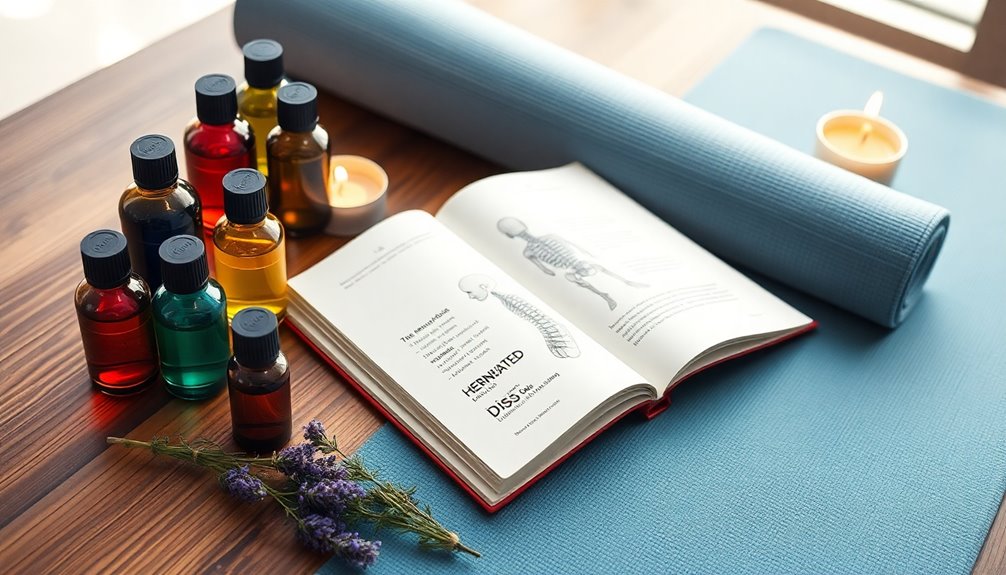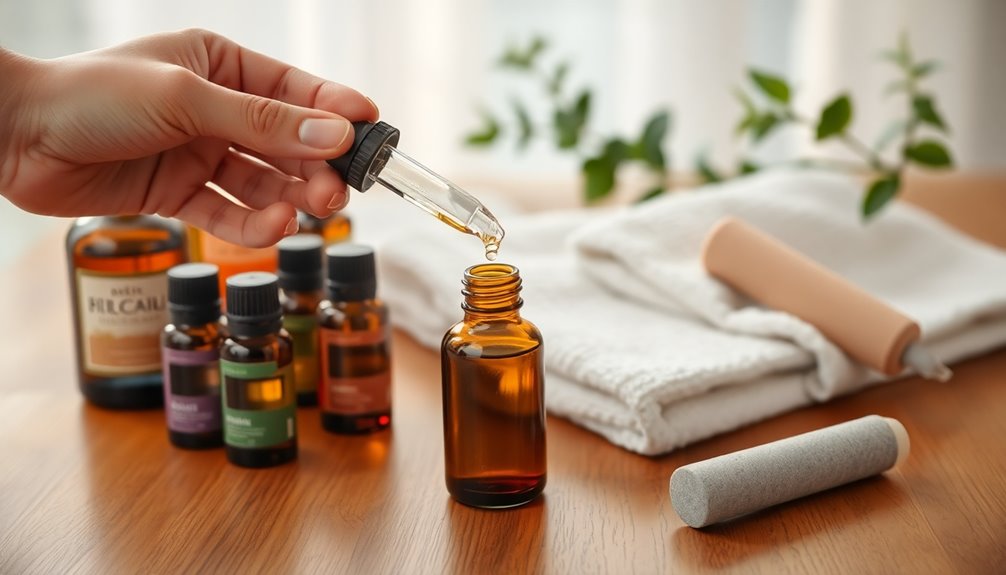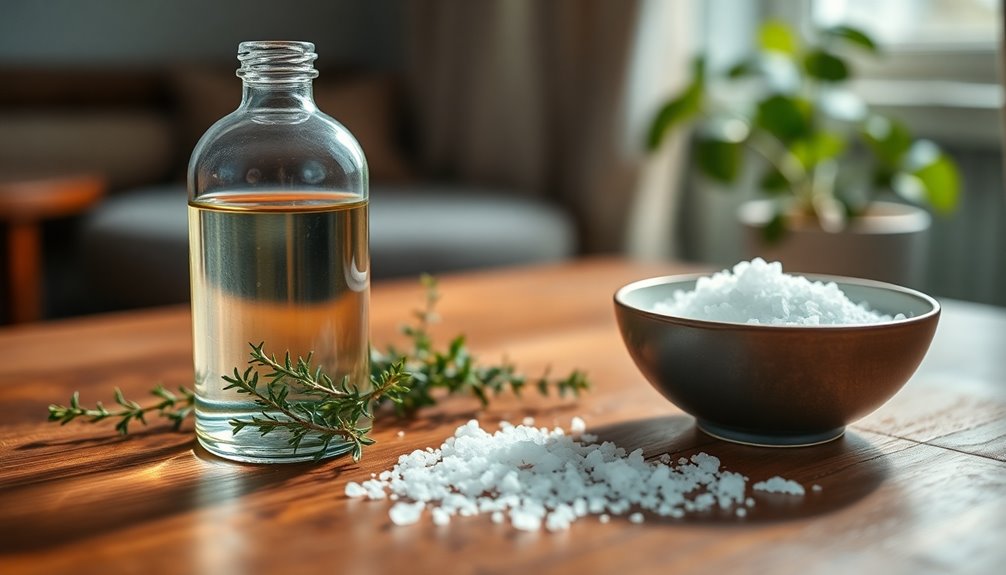Essential oils can help you find natural relief from herniated disk pain. Oils like lavender, peppermint, and ginger contain anti-inflammatory properties that may ease discomfort. You can apply them by diluting 2-3 drops with a tablespoon of a carrier oil, like coconut or jojoba, and massaging the mixture onto the affected area. Consider adding a warm compress afterward to enhance blood flow. Just remember to conduct a patch test before full application to avoid skin irritation. By exploring different oils and techniques, you can discover the perfect combination for your pain relief journey. There's much more to explore!
Key Takeaways
- Essential oils like lavender, peppermint, and ginger possess anti-inflammatory properties that can help alleviate herniated disk pain naturally.
- Dilute essential oils with carrier oils at a ratio of 2-3 drops per tablespoon to prevent skin irritation before application.
- Apply diluted oils directly to the affected areas, massaging them in for enhanced absorption and pain relief.
- Consider using a warm compress after applying essential oils to improve blood flow and further relieve discomfort.
- Always conduct a patch test before full application to check for allergic reactions to essential oils.
Understanding Herniated Disks

When you think about back pain, a herniated disc might be the culprit, as it occurs when the outer layer of an intervertebral disc tears, letting the inner core bulge out. This bulging can lead to nerve compression, which often results in lower back pain and discomfort.
Herniated discs are commonly found in the lumbar region, primarily due to age-related wear and tear, improper lifting techniques, or sudden injuries. Fortunately, about 90% of individuals with a herniated disc find relief through conservative treatments within six months.
These treatments can include physical therapy, pain medications, and lifestyle changes that aim to relieve pain and restore function. Understanding this condition is vital for managing your symptoms effectively.
Symptoms of Herniated Disk Pain

How do you know if you're dealing with herniated disk pain? You might feel localized back pain that can radiate down your legs.
This discomfort often comes with numbness or tingling due to nerve compression. You might also experience sciatica, where sharp pain travels from your lower back through your buttocks and into your legs.
The severity of these symptoms can vary; some days, you may feel mild discomfort, while other days, the pain could be debilitating, making it hard to sit, bend, or even walk.
Additionally, you might notice muscle weakness in your legs or feet, which can further hinder your daily activities.
If you experience bladder or bowel dysfunction, seek medical help immediately.
Causes of Herniated Disks

Herniated disks can often result from age-related wear and tear, which weakens the discs over time.
Poor posture and a sedentary lifestyle also play significant roles, putting extra strain on your spine.
Understanding these causes can help you take proactive steps to protect your back.
Age-Related Wear and Tear
As we age, the natural wear and tear on our bodies can considerably impact spinal health, leading to a higher risk of herniated disks. Over 50% of older adults show signs of disk degeneration, which can cause chronic pain.
Here are three key factors contributing to age-related wear and tear:
- Loss of hydration: Spinal discs lose water content, making them less elastic.
- Increased susceptibility: Normal activities can easily lead to bulging and herniation.
- Chronic conditions: Issues like osteoarthritis add stress to your spine.
Incorporating essential oils with anti-inflammatory properties can help alleviate some discomfort associated with herniated disks. Additionally, establishing a structured routine can promote overall well-being and aid in pain management.
Poor Posture and Strain
When you maintain poor posture, whether sitting for long periods or standing incorrectly, you're increasing the pressure on your spinal discs, which can lead to herniation. Activities like repetitive bending, twisting, or improper lifting can further strain your back. To reduce pain effectively, consider how you position yourself throughout the day.
| Factor | Impact on Herniated Discs |
|---|---|
| Poor Posture | Increases disc pressure |
| Weak Core Strength | Reduces spinal support |
| Excessive Weight | Alters spinal alignment |
Incorporating essential oils can help manage back pain, but addressing posture is vital. By improving your ergonomic practices at work and being mindful of your body mechanics, you can considerably lower your risk of developing herniated discs.
Sedentary Lifestyle Impact
A sedentary lifestyle can greatly impact your spinal health, making it essential to incorporate movement into your daily routine.
Here are three ways a lack of physical activity can lead to herniated discs:
- Weakened Muscles: Prolonged sitting weakens your back muscles, reducing support for your spine.
- Increased Pressure: Sitting for long periods puts excess pressure on intervertebral discs, making them prone to bulging.
- Exacerbated Inflammation: Limited movement can increase inflammation and stiffness, leading to more back pain.
To combat these issues, prioritize regular physical activity.
It can help strengthen your muscles, improve posture, and reduce inflammation, lowering your risk of developing herniated discs.
Don't let a sedentary lifestyle dictate your spinal health!
Essential Oils for Pain Relief

Essential oils offer a natural option for pain relief that many find effective, especially for conditions like herniated discs. Oils such as basil, lavender, and frankincense possess anti-inflammatory and analgesic properties, helping alleviate back pain.
Incorporating peppermint essential oil into your routine can provide immediate muscle relaxation and enhance your mobility. For ideal pain management, you can use topical essential oils diluted with carrier oils to prevent skin irritation while maximizing their therapeutic effects. Studies indicate that certain scents can reduce cortisol levels, a stress hormone that may contribute to pain perception.
Regular application of these oils may lead to significant improvements in your quality of life. Remember, while essential oils can support your pain relief efforts, they work best as complementary treatments alongside conventional medical therapies for managing herniated disc discomfort.
Application Methods for Essential Oils

When using essential oils for herniated disk pain, it's vital to dilute them with a carrier oil like coconut or jojoba to avoid skin irritation.
You can apply these diluted oils topically to the painful area for targeted relief.
Let's explore some effective application techniques to maximize the benefits of these oils.
Dilution and Carrier Oils
To safely enjoy the benefits of essential oils for herniated disk pain, it's crucial to dilute them with a carrier oil like coconut or jojoba. This helps prevent skin irritation and enhances absorption.
Here's how you can do it:
- Dilution Ratio: Use 2-3 drops of essential oil per tablespoon of carrier oil.
- Select Your Oils: Consider using peppermint or lavender for targeted relief on your lower back or neck.
- Conduct a Patch Test: Always test the diluted mixture on a small skin area first to check for allergic reactions. Additionally, it's important to stay hydrated, as soluble fiber in chia seeds can aid in digestion and overall health when incorporated into your diet.
Topical Application Techniques
While applying essential oils for herniated disk pain, using effective techniques can greatly enhance their benefits. Start by diluting essential oils with a carrier oil, like coconut or jojoba, at a ratio of 2-3 drops per teaspoon. Apply the mixture directly to the affected area, gently massaging it into your skin to boost absorption and relaxation. Consider using a warm compress afterward to improve blood flow and amplify pain relief. Essential oils such as lavender and peppermint are excellent choices due to their analgesic and anti-inflammatory properties. Always conduct a patch test before full application to check for allergies.
| Technique | Description |
|---|---|
| Dilution | Mix essential oils with carrier oil. |
| Direct Application | Apply diluted oil to the affected area. |
| Massage | Gently massage to enhance absorption. |
| Warm Compress | Use after application for added effect. |
| Patch Test | Check for allergic reactions first. |
Safety and Precautions

Essential oils can offer relief for herniated disk pain, but it's important to prioritize safety and precautions. Here are three key points to keep in mind:
- Always dilute essential oils with a carrier oil before applying them topically to avoid skin irritation or allergic reactions.
- Never ingest essential oils unless you're under the direct supervision of a healthcare provider, as this can be highly toxic.
- Conduct a patch test before using a new essential oil, especially if you have sensitive skin, to check for potential allergic reactions.
If you're pregnant or nursing, consult your healthcare provider before using essential oils, as some may not be safe.
Store your oils in a cool, dark place, out of children's reach, to maintain their potency.
Complementary Treatments and Strategies

After ensuring safety with essential oils, it's time to explore complementary treatments and strategies that can enhance your recovery from herniated disk pain.
Physical therapy plays an important role, offering tailored exercises to boost mobility and strength while alleviating chronic low back pain.
Consider chiropractic care, which uses targeted spinal adjustments to realign discs and reduce nerve impingement.
Incorporating regular stretching and mobility exercises will enhance flexibility, further reducing the risk of injury.
Don't overlook nutritional support; an anti-inflammatory diet rich in omega-3 fatty acids and antioxidants can aid in reducing inflammation.
Finally, mindfulness techniques like meditation and yoga help manage pain perception and stress, providing additional support in your recovery journey. Additionally, engaging in digital literacy programs can enhance communication and connection, which may positively impact mental well-being during recovery.
Lifestyle Changes for Back Health

Making lifestyle changes can considerably enhance your back health and help manage herniated disk pain. Here are three effective strategies:
- Stay Active: Engage in low-impact exercises and core strengthening routines to maintain flexibility and reduce chronic lower back pain.
- Ergonomics Matter: Adjust your workspace with supportive chairs and practice good posture to avoid exacerbating back issues while treating back pain.
- Balanced Diet: Incorporate an anti-inflammatory diet rich in omega-3 fatty acids and antioxidants to support spinal health. Additionally, staying hydrated is crucial as adequate water intake can help maintain spinal disc health.
Frequently Asked Questions
What Oil Is Good for a Herniated Disc?
When you're looking for oils to help with a herniated disc, consider Helichrysum oil for its healing properties and anti-inflammatory effects.
Wintergreen oil can provide pain relief due to its natural compounds.
Lavender and Basil oils might also help you relax and ease tension.
Remember to mix these essential oils with a carrier oil to avoid skin irritation.
Using them in aromatherapy can enhance your overall comfort and well-being.
What Essential Oil Can I Use for Back Pain?
Imagine you're struggling to get out of bed, your back aching with every movement.
If you're looking for relief, consider using lavender essential oil. It's known for its calming properties and may help alleviate pain. You can mix it with a carrier oil and massage it into your back.
Just remember to do a patch test first to avoid irritation. While it's not a miracle cure, it might provide some comfort during tough days.
What Helps Bulging Disc Pain in Lower Back at Home?
To manage bulging disc pain at home, you can start by applying hot or cold packs to reduce inflammation and tension.
Incorporate regular stretching and mobility exercises, like yoga or Pilates, to enhance flexibility and strengthen your core.
Eating an anti-inflammatory diet rich in omega-3s and antioxidants can support disc health.
Gentle activities such as walking or swimming help promote blood flow, while ensuring you don't exacerbate your pain.
What Essential Oil Is Good for Nerve Repair?
Imagine soothing your nerves like a gentle breeze on a warm day.
When it comes to nerve repair, consider essential oils like Helichrysum, known for its anti-inflammatory magic.
Rosemary may enhance circulation, helping your nerves heal faster.
Don't forget peppermint, which cools and alleviates discomfort, and lavender, calming your mind and body.
Just remember to dilute these oils properly and consult with a healthcare professional for the best results on your healing journey.
Conclusion
In the quest for relief from herniated disk pain, essential oils can be your soothing allies, much like a gentle breeze on a sweltering day. By incorporating these natural remedies and making mindful lifestyle changes, you can commence a journey toward comfort and healing. Remember, just as a flower needs the right environment to bloom, your back health flourishes with care and attention. Embrace these strategies, and let your path to relief begin!










